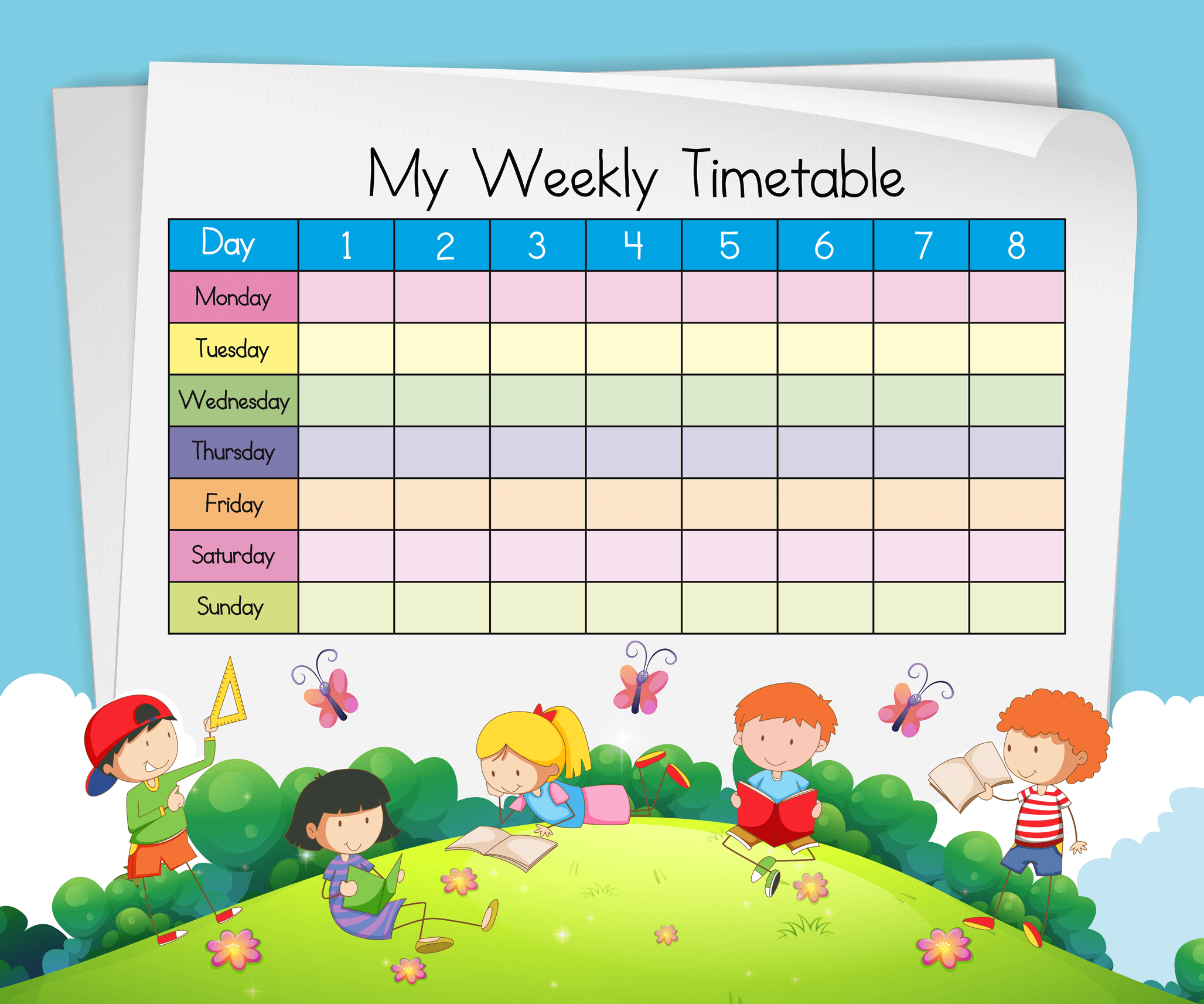The best CBSE Schools in Ahmedabad, including us, are all worried about one thing – children’s screen time. Excessive screen time can be harmful to your child’s development. In a report, it is stated that children below 8 years of age spend a staggering 6.5 hours in front of screens every day! This makes it all important for parents to limit their child’s screen time.
Disciplining your child’s screen time isn’t easy, especially in today’s time when schools are being conducted online. But whether you want to limit their TV time because of studies or because you want to encourage more active play, you can use these tips from a top CBSE School in Ahmedabad and our personalised child counsellors to help you keep your child’s screen-time in check.
Here are 5 ways to help you out

Prepare a Time-Table
Define in advance the permitted time limits of screen usage. Once you’ve defined how much screen time your kids can have, create a calendar with set times for specific activities. For example, if your child is allowed only an hour of screen time per day after school but gets home from school at 2:30 p.m., you’ll need to put down screen time between 3 and 4 p.m., along with something else, like studying or playing outside.

Check School Homework Daily
Children learn in different ways and at different rates, meaning that what might be easy for one child could be difficult for another. If your child has trouble understanding material from school, it’s important to help them understand it in ways that make sense to them. Homework can play an important role in this process as well as prepare your child to do better on tests and assignments down the road. Therefore, even if your child only needs help with one or two subjects, checking their homework daily can still be a great way to give them extra support when they need it most.

Reading Time Activity
It’s important to spend time with your children in order to help them learn and grow into well-rounded individuals. One way you can do this is by reading with them at night before bedtime, as this gives you the opportunity to engage in quality time together and develop your child’s love of reading in a relaxed environment.

Board Games
Everyone wants to create strong relationships with their children, especially when they’re young. There are so many ways to do that, but one of the best is playing games with them. Games are an easy way to connect with your kids; no matter how old they are, they can learn something from you and at the same time have fun playing together.


Household Chores Activity With Children

Teaching children how to do chores can seem like an incredibly daunting task at first. Engaging your children in household chores can be tricky, but it’s important that they learn the responsibilities of household life early on in their lives. Chores can be difficult to get kids to help with, especially if the chores themselves are boring and repetitive in nature. It’s important that parents teach their children how to do household chores properly and show them the value of doing chores around the house, but it’s also important that parents have fun when they work with their children to develop good habits and skills that will last them throughout their lives.
Create bedtime rituals
Bedtime rituals are an important part of childhood development, as they ensure your child falls asleep quickly and stays asleep all night long. A bedtime ritual should be based on the child’s temperament, lifestyle, and needs in order to be most effective; however, every ritual should include a few basic components like baths, PJs, quiet time with toys or reading books, and goodnight kisses or hugs from parents. Developing bedtime rituals will help children feel safe, secure, and loved at the end of the day, and will ensure that they get enough sleep to succeed in their school activities the next day.

Cultivate Creative Hobbies
It’s true that children learn best through play. The problem is that it’s hard to know whether you’re giving your child a healthy balance of screen time, especially when there are so many devices vying for their attention. This makes it important to cultivate creative hobbies in your child, such as drawing or reading, which help give them an outlet from screens without forcing them to pick up one.
Weekend Fun Activities
Choosing activities that aren’t screen-related can help limit your child’s screen time. Introduce new and fun activities for your children to engage in while at home. A few ideas are playing a board game, taking a long walk, or going out for ice cream with family members. Activities that don’t involve a screen are better at encouraging physical fitness and creativity. The introduction of these types of activities will teach your children how to take breaks from their technology without feeling bored or sad.

Have a no-gadget hour at home
If you’re looking to limit your child’s screen time, it makes sense to start at home. Set a timer for one hour and clear away all screens from your kitchen countertops and dining table; now you can have dinner without interruptions! This strategy is known as designated screen-free time at home.
KNOW MORE ABOUT: FIVE FACTS YOU NEED TO KNOW ABOUT FROM ONLINE CLASSES

Limit your own screen time
Lead by an example. If you want your child to spend less time in front of screens, it’s probably best if you cut back in front of them as well. The less they see of you spending time on social media or checking email, the less likely they are to think that screen time is a good use of their time too.
Even a small amount of screen time for a young child can inhibit them from developing essential cognitive skills (including imagination). As parents, you can’t shield your children from every potential hazard. But by limiting screen time, for them and for yourself, you can give your kids a better shot at success and happiness. And if the condition has gone beyond repair, it would be a sensible option to get personalized counselling services for your child. Talk to us and we will arrange personalized counselling services for your child!






